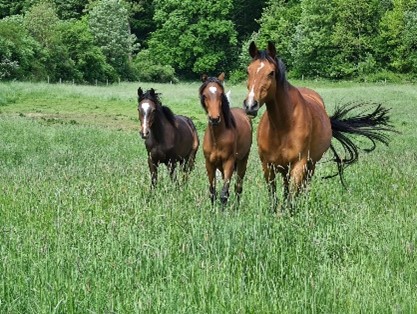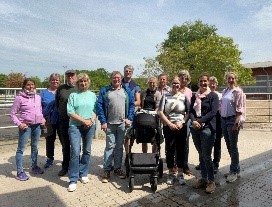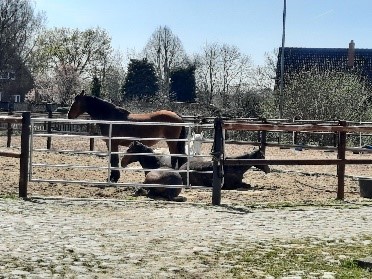Jakie wyzwanie/problem rozwiązano??
Ustawa o dobrostanie zwierząt od 2014 nakłada na hodowców koni obowiązek wprowadzenia obowiązkowych kontroli dobrostanu w swoich gospodarstwach. Pomimo tego przepisu, wielu właścicieli koni nie jest tego świadomych lub ma trudności ze skutecznym przeprowadzeniem tych kontroli. Projekt ma na celu opracowanie i wdrożenie cyfrowej listy kontrolnej do oceny dobrostanu zwierząt w oparciu o wybrane kluczowe wskaźniki dla stadnin koni w Szlezwiku-Holsztynie. Charakteryzuje się udostępnieniem ogólnokrajowego narzędzia do oceny dobrostanu zwierząt w stadninach koni w Szlezwiku-Holsztynie. Narzędzie zostanie użyte, między innymi, prowadzenie i dokumentowanie wymaganej prawem samokontroli w gospodarstwach oraz optymalizacja utrzymania koni w gospodarstwach indywidualnych. Narzędzie pomoże właścicielom zwierząt gospodarskich w pokonaniu ślepoty operacyjnej, a tym samym zapewni pozytywny rozwój gospodarstw. Nacisk kładziony jest na analizę słabych punktów na farmie. W ten sposób, Podstawowe ryzyko dla dobrostanu zwierząt można rozpoznać na wczesnym etapie, a coraz bardziej emocjonalną debatę na ten temat można zobiektyzować.
Jak rozwiązałeś problem??
EIP-Project „Opieka zwierząt dla koni” opracowuje cyfrową listę kontrolną oceny dobrostanu zwierząt na farmach koni w oparciu o kluczowe wskaźniki dobrostanu zwierząt. Wskaźniki te zostaną wybrane i przetestowane pod kątem praktyczności przez grupę roboczą składającą się z aktywnych gospodarstw koni i różnych instytucji w ramach projektu EIP. Projekt obejmuje również inicjatywy edukacyjne dla menedżerów gospodarstw poprzez programy szkoleniowe i public relations. Lista kontrolna jest przeznaczona do powszechnego użytku w Niemczech.
Co jest innowacyjne w Twoim praktycznym przypadku?
Innowacja to tworzenie praktycznego, Cyfrowa lista kontrolna w celu samokontroli na farmach koni. To narzędzie jest zaprojektowane tak, aby było przyjazne dla użytkownika dla menedżerów farm, ułatwianie codziennych użytkowania w celu zapewnienia wysokich standardów dobrostanu zwierząt.
Jakie są czynniki sukcesu w rozwiązaniu problemu?
Chociaż projekt jest nadal na wczesnym etapie, Jego czynniki sukcesu obejmują dedykowaną i kompetentną grupę roboczą, aktywny udział z przykładowych praktycznych gospodarstw, oraz zbiorowa motywacja do rozwijania wiedzy i praktyk w interesie dobrostanu zwierząt w systemach hodowli koni.
Nieoczekiwane niepowodzenia, Jeśli w ogóle
Jak dotąd, projekt nie napotkał żadnych znaczących niepowodzeń.
Zdobyta wiedza
- Ponieważ projekt jest wciąż w początkowej fazie, Należy podjąć dalsze kroki w celu uzyskania wiedzy.
- Zdaliśmy sobie sprawę, że ważne jest dla nas zidentyfikowanie kluczowych wskaźników obejmujących wszystkie ważne aspekty dobrobytu koni.
- Budowanie zespołu i praca zespołowa jest jednym z strategii, które aktorzy projektowi ustanowili na początku projektów, aby działania projektowe działały sprawnie i skutecznie, a także skupić się na celach i celach projektu.
- Zdefiniowanie wyraźnych celów projektu i spójności działań projektowych dla aktorów, a także wyraźne stwierdzenie roli każdego aktora przed rozpoczęciem projektu jest ważne, ponieważ pozwala uniknąć zamieszania lub przekierowania celów projektu. Umożliwia to wydajne i efektywne wykorzystanie zasobów projektowych, takich jak fundusze i czas.
- Ważnym czynnikiem jest aktywne słuchanie, aby móc współczuć z drugą osobą i postrzegać jej życzenia i potrzeby. Stanowi to podstawę do zadawania konkretnych pytań w celu ustrukturyzowania konsultacji, Znajdź rozwiązania i podjąć działania w dalszym sporze.
Jaką rolę pełni doradca lub służba doradcza w praktycznej sprawie??
Zapewnienie wiedzy ,prowadzenie badań i zapewnianie ustaleń dla podmiotów projektu. Oczekuje się, że doradca zapozna się z rozwiązaniami pytań i problemów, które aktorzy mają w okresie projektu.
Czy Twoje podejście można przenieść i/lub dostosować do innych wyzwań i regionów związanych z innowacjami??
tak.
Szacowana zbywalność w skali od 1 Twierdzenie, że na ostateczną jakość mięsa negatywnie wpływa stres zwierząt związany z transportem 5
(gdzie 1 jest łatwe i 5 bardzo trudne)
2
Za podzielenie się doświadczeniami dotyczącymi dobrych praktyk, prosimy o kontakt Zaklęcie, Laura Maxi (lmstange@lksh.de)
https://www.eip-agrar-sh.de/eip-innovationsprojekte/4-call/tiergerechtheit-pferd


